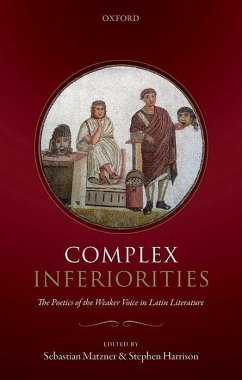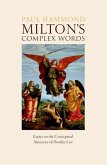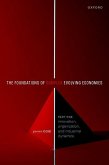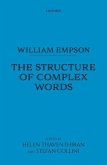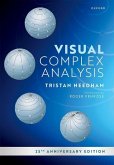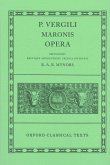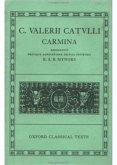Complex Inferiorities
The Poetics of the Weaker Voice in Latin Literature
Herausgeber: Matzner, Sebastian; Harrison, Stephen
Complex Inferiorities
The Poetics of the Weaker Voice in Latin Literature
Herausgeber: Matzner, Sebastian; Harrison, Stephen
- Gebundenes Buch
- Merkliste
- Auf die Merkliste
- Bewerten Bewerten
- Teilen
- Produkt teilen
- Produkterinnerung
- Produkterinnerung
The deliberate adoption of a 'weaker' voice by a speaker not obliged to do so is a widespread phenomenon in Latin literature. This volume traces this strategy across a range of genres, periods, and authors, exploring how it establishes, perpetuates, and challenges hierarchies and values in very different literary and cultural-political contexts.
Andere Kunden interessierten sich auch für
![Milton's Complex Words Milton's Complex Words]() Prof Paul Hammond (Professor of Seventeenth-Century English LiteratMilton's Complex Words52,99 €
Prof Paul Hammond (Professor of Seventeenth-Century English LiteratMilton's Complex Words52,99 €![Practical Management of Complex Cancer Pain Practical Management of Complex Cancer Pain]() Practical Management of Complex Cancer Pain80,99 €
Practical Management of Complex Cancer Pain80,99 €![The Foundations of Complex Evolving Economies The Foundations of Complex Evolving Economies]() Giovanni Dosi (Professor of Economics, Professor of Economics, SantThe Foundations of Complex Evolving Economies52,99 €
Giovanni Dosi (Professor of Economics, Professor of Economics, SantThe Foundations of Complex Evolving Economies52,99 €![William Empson: The Structure of Complex Words William Empson: The Structure of Complex Words]() William EmpsonWilliam Empson: The Structure of Complex Words176,99 €
William EmpsonWilliam Empson: The Structure of Complex Words176,99 €![Visual Complex Analysis Visual Complex Analysis]() Tristan Needham (Professor of Mathematics Professor of MathematicsVisual Complex Analysis40,99 €
Tristan Needham (Professor of Mathematics Professor of MathematicsVisual Complex Analysis40,99 €![Opera Opera]() VergilOpera60,99 €
VergilOpera60,99 €![C. Valerii Catvlli Carmina C. Valerii Catvlli Carmina]() CatullC. Valerii Catvlli Carmina17,99 €
CatullC. Valerii Catvlli Carmina17,99 €-
-
-
The deliberate adoption of a 'weaker' voice by a speaker not obliged to do so is a widespread phenomenon in Latin literature. This volume traces this strategy across a range of genres, periods, and authors, exploring how it establishes, perpetuates, and challenges hierarchies and values in very different literary and cultural-political contexts.
Produktdetails
- Produktdetails
- Verlag: Oxford University Press
- Seitenzahl: 336
- Erscheinungstermin: 8. Januar 2019
- Englisch
- Abmessung: 218mm x 145mm x 28mm
- Gewicht: 536g
- ISBN-13: 9780198814061
- ISBN-10: 0198814062
- Artikelnr.: 54018340
- Verlag: Oxford University Press
- Seitenzahl: 336
- Erscheinungstermin: 8. Januar 2019
- Englisch
- Abmessung: 218mm x 145mm x 28mm
- Gewicht: 536g
- ISBN-13: 9780198814061
- ISBN-10: 0198814062
- Artikelnr.: 54018340
Sebastian Matzner is Senior Lecturer in Comparative Literature at King's College London. His research focuses on interactions between ancient and modern literature and thought, especially in the fields of poetics and rhetoric, literary and critical theory, history of sexualities, LGBTQ studies, and traditions of classicism. He has published several articles and book chapters in these fields and is the author of Rethinking Metonymy: Literary Theory and Poetic Practice from Pindar to Jakobson (OUP, 2016) as well as co-editor of a forthcoming OUP volume entitled Metalepsis: Ancient Texts, New Perspectives (with Gail Trimble). Stephen Harrison is Professor of Latin Literature at the University of Oxford, and Fellow and Tutor in Classics at Corpus Christi College. His main research and teaching interests are in Latin literature and its reception. He has written monographs on Vergil, Horace, and Apuleius, and has edited, co-edited, or co-authored more than twenty books on Vergil, Horace, the Roman novel, Classics and literary theory, and Latin literature in general, as well as on the reception of classical literature. His recent publications include Victorian Horace: Classics and Class (Bloomsbury, 2017) and a commentary on Horace Odes 2 (CUP, 2017).
* Frontmatter
* Note on Abbreviations
* List of Contributors
* 0: Sebastian Matzner: Introduction: Latin Literature's Complex
Inferiorities
* 1: William Fitzgerald: Claiming Inferiority: Weakness into Strength
* 2: Sebastian Matzner: How Do You Solve a Problem like Horace? On
Roman Philhellenism and Postcolonial Critique
* 3: Amy Richlin: Blackface and Drag in the Palliata
* 4: Jean-Claude Julhe: Social Inferiority and Poetic Inferiority -
Martial's Revenge in his Epigrams: A Commentary on Martial 5.13
* 5: Tom Geue: Drawing Blanks: The Pale Shades of 'Phaedrus' and
'Juvenal'
* 6: Victoria Rimell: The Creative Superiority of Self-Reproach:
Horace's Ars Poetica
* 7: Ellen O'Gorman: 'The Noise, and the People': Popular clamor and
Political Discourse in Latin Historiography
* 8: Dunstan Lowe: Loud and Proud: The Voice of the praeco in Roman
Love-Elegy
* 9: Stephen Harrison: Hidden Voices: Homoerotic Colour in Horace's
Odes
* 10: G. O. Hutchinson: On Not Being Beautiful
* 11: Vassiliki Panoussi: From Adultery to Incest: Messalina and
Agrippina as Sexual Aggressors in Tacitus' Annals
* 12: Shadi Bartsch: The Aeneid as 'Weaker Text' and Fulgentius'
Radical Hermeneutics
* 13: Philip Hardie: Cowherds and Saints: Paulinus of Nola Carmen 18
* Endmatter
* References
* General Index
* Index Locorum
* Note on Abbreviations
* List of Contributors
* 0: Sebastian Matzner: Introduction: Latin Literature's Complex
Inferiorities
* 1: William Fitzgerald: Claiming Inferiority: Weakness into Strength
* 2: Sebastian Matzner: How Do You Solve a Problem like Horace? On
Roman Philhellenism and Postcolonial Critique
* 3: Amy Richlin: Blackface and Drag in the Palliata
* 4: Jean-Claude Julhe: Social Inferiority and Poetic Inferiority -
Martial's Revenge in his Epigrams: A Commentary on Martial 5.13
* 5: Tom Geue: Drawing Blanks: The Pale Shades of 'Phaedrus' and
'Juvenal'
* 6: Victoria Rimell: The Creative Superiority of Self-Reproach:
Horace's Ars Poetica
* 7: Ellen O'Gorman: 'The Noise, and the People': Popular clamor and
Political Discourse in Latin Historiography
* 8: Dunstan Lowe: Loud and Proud: The Voice of the praeco in Roman
Love-Elegy
* 9: Stephen Harrison: Hidden Voices: Homoerotic Colour in Horace's
Odes
* 10: G. O. Hutchinson: On Not Being Beautiful
* 11: Vassiliki Panoussi: From Adultery to Incest: Messalina and
Agrippina as Sexual Aggressors in Tacitus' Annals
* 12: Shadi Bartsch: The Aeneid as 'Weaker Text' and Fulgentius'
Radical Hermeneutics
* 13: Philip Hardie: Cowherds and Saints: Paulinus of Nola Carmen 18
* Endmatter
* References
* General Index
* Index Locorum
* Frontmatter
* Note on Abbreviations
* List of Contributors
* 0: Sebastian Matzner: Introduction: Latin Literature's Complex
Inferiorities
* 1: William Fitzgerald: Claiming Inferiority: Weakness into Strength
* 2: Sebastian Matzner: How Do You Solve a Problem like Horace? On
Roman Philhellenism and Postcolonial Critique
* 3: Amy Richlin: Blackface and Drag in the Palliata
* 4: Jean-Claude Julhe: Social Inferiority and Poetic Inferiority -
Martial's Revenge in his Epigrams: A Commentary on Martial 5.13
* 5: Tom Geue: Drawing Blanks: The Pale Shades of 'Phaedrus' and
'Juvenal'
* 6: Victoria Rimell: The Creative Superiority of Self-Reproach:
Horace's Ars Poetica
* 7: Ellen O'Gorman: 'The Noise, and the People': Popular clamor and
Political Discourse in Latin Historiography
* 8: Dunstan Lowe: Loud and Proud: The Voice of the praeco in Roman
Love-Elegy
* 9: Stephen Harrison: Hidden Voices: Homoerotic Colour in Horace's
Odes
* 10: G. O. Hutchinson: On Not Being Beautiful
* 11: Vassiliki Panoussi: From Adultery to Incest: Messalina and
Agrippina as Sexual Aggressors in Tacitus' Annals
* 12: Shadi Bartsch: The Aeneid as 'Weaker Text' and Fulgentius'
Radical Hermeneutics
* 13: Philip Hardie: Cowherds and Saints: Paulinus of Nola Carmen 18
* Endmatter
* References
* General Index
* Index Locorum
* Note on Abbreviations
* List of Contributors
* 0: Sebastian Matzner: Introduction: Latin Literature's Complex
Inferiorities
* 1: William Fitzgerald: Claiming Inferiority: Weakness into Strength
* 2: Sebastian Matzner: How Do You Solve a Problem like Horace? On
Roman Philhellenism and Postcolonial Critique
* 3: Amy Richlin: Blackface and Drag in the Palliata
* 4: Jean-Claude Julhe: Social Inferiority and Poetic Inferiority -
Martial's Revenge in his Epigrams: A Commentary on Martial 5.13
* 5: Tom Geue: Drawing Blanks: The Pale Shades of 'Phaedrus' and
'Juvenal'
* 6: Victoria Rimell: The Creative Superiority of Self-Reproach:
Horace's Ars Poetica
* 7: Ellen O'Gorman: 'The Noise, and the People': Popular clamor and
Political Discourse in Latin Historiography
* 8: Dunstan Lowe: Loud and Proud: The Voice of the praeco in Roman
Love-Elegy
* 9: Stephen Harrison: Hidden Voices: Homoerotic Colour in Horace's
Odes
* 10: G. O. Hutchinson: On Not Being Beautiful
* 11: Vassiliki Panoussi: From Adultery to Incest: Messalina and
Agrippina as Sexual Aggressors in Tacitus' Annals
* 12: Shadi Bartsch: The Aeneid as 'Weaker Text' and Fulgentius'
Radical Hermeneutics
* 13: Philip Hardie: Cowherds and Saints: Paulinus of Nola Carmen 18
* Endmatter
* References
* General Index
* Index Locorum
